2011年山东高考专题-2004年英语听力原文(全国卷Ⅰ)学习啊
2011年高考英语听力(全国1卷
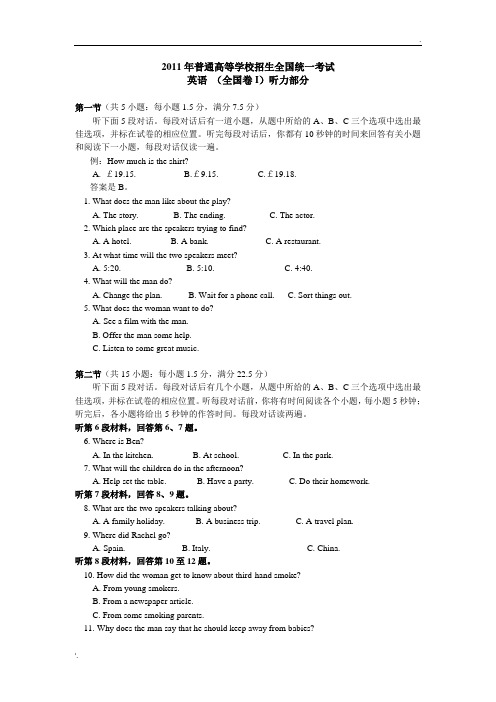
2011年普通高等学校招生全国统一考试英语(全国卷I)听力部分第一节(共5小题:每小题1.5分,满分7.5分)听下面5段对话。
每段对话后有一道小题,从题中所给的A、B、C三个选项中选出最佳选项,并标在试卷的相应位置。
听完每段对话后,你都有10秒钟的时间来回答有关小题和阅读下一小题,每段对话仅读一遍。
例:How much is the shirt?A. £19.15.B.£9.15.C.£19.18.答案是B。
1. What does the man like about the play?A. The story.B. The ending.C. The actor.2. Which place are the speakers trying to find?A. A hotel.B. A bank.C. A restaurant.3. At what time will the two speakers meet?A. 5:20.B. 5:10.C. 4:40.4. What will the man do?A. Change the plan.B. Wait for a phone call.C. Sort things out.5. What does the woman want to do?A. See a film with the man.B. Offer the man some help.C. Listen to some great music.第二节(共15小题:每小题1.5分,满分22.5分)听下面5段对话。
每段对话后有几个小题,从题中所给的A、B、C三个选项中选出最佳选项,并标在试卷的相应位置。
听每段对话前,你将有时间阅读各个小题,每小题5秒钟;听完后,各小题将给出5秒钟的作答时间。
每段对话读两遍。
听第6段材料,回答第6、7题。
6. Where is Ben?A. In the kitchen.B. At school.C. In the park.7. What will the children do in the afternoon?A. Help set the table.B. Have a party.C. Do their homework.听第7段材料,回答8、9题。
2011 山东 高考 听力原文
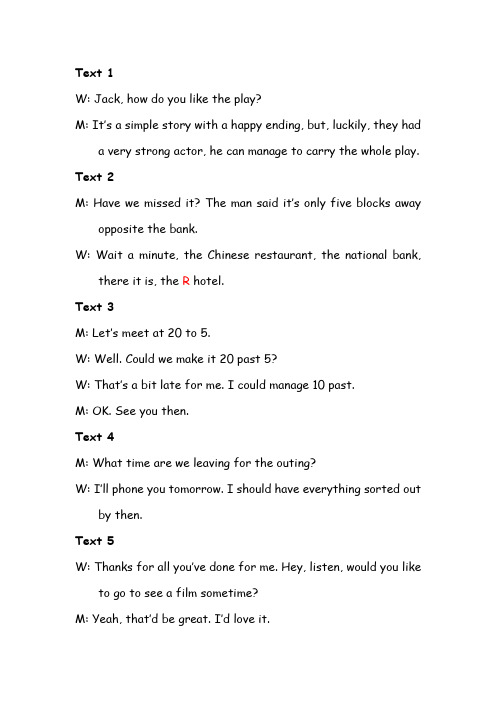
W: Jack, how do you like the play?M: It’s a simple story with a happy ending, but, luckily, they hada very strong actor, he can manage to carrythe whole play. Text 2M: Have we missed it? The man said it’s only five blocks away opposite the bank.W: Wait a minute, the Chinese restaurant, the national bank, there it is, the R hotel.Text 3M: Let’s meet at 20 to 5.W: Well. Could we make it 20 past 5?W: That’s a bit late for me. I could manage 10 past.M: OK. See you then.Text 4M: What time are we leaving for the outing?W: I’ll phone you tomorrow. I should have everything sorted out by then.Text 5W: Thanks for all you’ve done for me. Hey, listen, would you like to go to see a film sometime?M: Yeah, that’d be great. I’d love it.W: Hey, where is everybody?M: They took Ben to the park. Where have you been?W: Sorry, I’m late. I picked up the cake and it took me longer than Iexpected. When will the party start?M: Ben invited eight children from school. And they’ll arrive at about 2 in the afternoon.W: OK. Then I’ll put the candles on the cake and leave it in the kitchen and then I’ll come and help set the table.Text 7M: So, Macy, how was your holiday?W: Oh, we loved it. Tom liked Germany best, but France was my favorite.M: So did Rachael finally go with you?W: No, she wasn’t able to. She was called a way for a business trip to china,M: That’s a pity. So where exactly did you go and visit?W: Well, we traveled all over, Italy, Spain and H; we even bathe in the Swiss lakeM: You did, really?Text 8W:Bob, I’m sure you know about second-hand smoke.M: Of course. I do.W: But have you heard about third-hand smoke?M: Third-hand smoke? I’m afraid not.What is that then?W: Well, it is here in today’s paper. Parents may think they are protecting children from second hand smoke when they smoke outside their home or only when the children are not there. But now researchers are warning about what they call third-hand smoke. When you smoke dangerous matters from cigarettes get into your hair and clothing. As babies are the weakest, when you come to a baby, you pass it to the baby and increase the chances of disease in the baby. M:Is that so. In that case I have to say that I should never get close to a baby.W: That’s right. Actually all smoking parents should do the same or better give it up completely.Text 9M: Hello, welcome to our program “Today City”. I’m Larry. We’re going to Louisville Kentucky where our guest Michelle Ray comes from. She is proud of her middle-sized city with a small town feel and big city dreams. Now, Michelle, tell us about your city.W: Thank you, Larry. Here is my city. Louisville is my city. Thefirst place I take visitors from out of town is to Highland for shopping and night life. When Ihave delicious AsianfoodI always go to the Zen Garden which provides wonderful allvegetable dishes.M: Wow, that’s interesting. Many people go for healthy food now.W: You can see that again. If I want to go camping and fishing, I go to the Red River area. For completely quiet I can hide away in my house with a good book from one of our public libraries.M: That all sounds very exciting. I’m sure some of our listeners will include Louisville in their travel plan for their next holiday. Thank you, Michelle.Text 10M: We are glad to have Dr. Garfield to talk to us today about dreams. Let me start by asking the first question. Does everyone dream?W: It appears that everyone does. Mostly when people say that they never dream, what they really mean is that they don’t remember their dreams or they don’t think their dreams are important. The reason behind is that they might have been made fun with their child when they firstreportedtheir dreams or it was so frightening that they just turned off dreaming completely. The other day, someone named Davis came to me and said that he used to be a great dreamer, but suddenly he stopped having dreams.I asked him what it happened. It turned out that his brother died by heart attack and he never expected that such a terrible thing would happen to a young person. Generally, when there was some frightening event and dream about it was too terrible. People prefer not to dream about it. Actually the worst thing you can do is stop dreaming. Because it means that the bad experience would be too painful to even appear in dreams. As long as you dream about it and even the dream is frightening, your mind is working on it. My personal opinion about what dreams do is they help us deal with our problems. We say certain pleaders take pleasant dreams. When a person is hurt deep inside, when a person is seriously ill or when a person has been really sad, if people turn off their dreams totally, it means they don’t love themselves to even think about it.。
2004年高考英语试题及答案
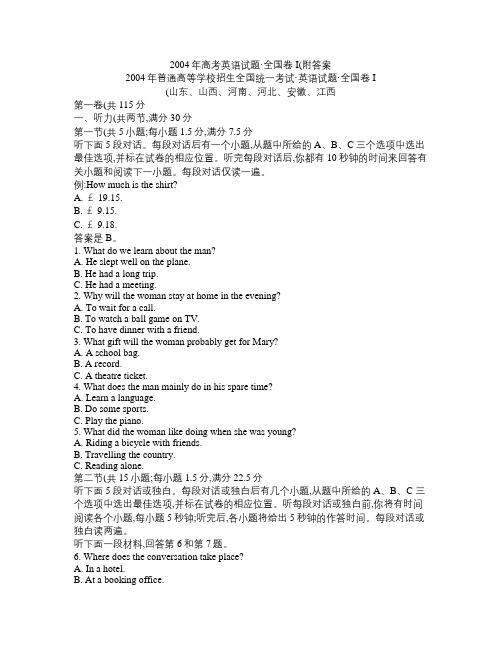
2004年高考英语试题·全国卷I(附答案2004年普通高等学校招生全国统一考试·英语试题·全国卷I(山东、山西、河南、河北、安徽、江西第一卷(共115分一、听力(共两节,满分30分第一节(共5小题;每小题1.5分,满分7.5分听下面5段对话。
每段对话后有一个小题,从题中所给的A、B、C三个选项中选出最佳选项,并标在试卷的相应位置。
听完每段对话后,你都有10秒钟的时间来回答有关小题和阅读下一小题。
每段对话仅读一遍。
例:How much is the shirt?A. £ 19.15.B. £ 9.15.C. £ 9.18.答案是B。
1. What do we learn about the man?A. He slept well on the plane.B. He had a long trip.C. He had a meeting.2. Why will the woman stay at home in the evening?A. To wait for a call.B. To watch a ball game on TV.C. To have dinner with a friend.3. What gift will the woman probably get for Mary?A. A school bag.B. A record.C. A theatre ticket.4. What does the man mainly do in his spare time?A. Learn a language.B. Do some sports.C. Play the piano.5. What did the woman like doing when she was young?A. Riding a bicycle with friends.B. Travelling the country.C. Reading alone.第二节(共15小题;每小题1.5分,满分22.5分听下面5段对话或独白。
2004年高考全国卷英语听力试题(含试题、听力音频、听力原文和答案)
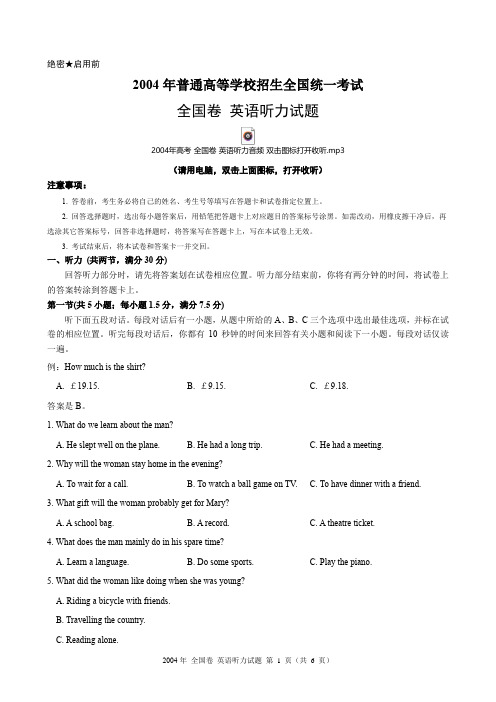
绝密★启用前2004年普通高等学校招生全国统一考试全国卷英语听力试题2004年高考 全国卷 英语听力音频 双击图标打开收听.mp3(请用电脑,双击上面图标,打开收听)注意事项:1. 答卷前,考生务必将自己的姓名、考生号等填写在答题卡和试卷指定位置上。
2. 回答选择题时,选出每小题答案后,用铅笔把答题卡上对应题目的答案标号涂黑。
如需改动,用橡皮擦干净后,再选涂其它答案标号,回答非选择题时,将答案写在答题卡上,写在本试卷上无效。
3. 考试结束后,将本试卷和答案卡一并交回。
一、听力(共两节,满分30分)回答听力部分时,请先将答案划在试卷相应位置。
听力部分结束前,你将有两分钟的时间,将试卷上的答案转涂到答题卡上。
第一节(共5小题;每小题1.5分,满分7.5分)听下面五段对话。
每段对话后有一小题,从题中所给的A、B、C三个选项中选出最佳选项,并标在试卷的相应位置。
听完每段对话后,你都有10秒钟的时间来回答有关小题和阅读下一小题。
每段对话仅读一遍。
例:How much is the shirt?A. £19.15.B. £9.15.C. £9.18.答案是B。
1. What do we learn about the man?A. He slept well on the plane.B. He had a long trip.C. He had a meeting.2. Why will the woman stay home in the evening?A. To wait for a call.B. To watch a ball game on TV.C. To have dinner with a friend.3. What gift will the woman probably get for Mary?A. A school bag.B. A record.C. A theatre ticket.4. What does the man mainly do in his spare time?A. Learn a language.B. Do some sports.C. Play the piano.5. What did the woman like doing when she was young?A. Riding a bicycle with friends.B. Travelling the country.C. Reading alone.第二节(共15小题;每小题1.5分,满分22.5分)听下面5段对话或独白。
04 全国 I
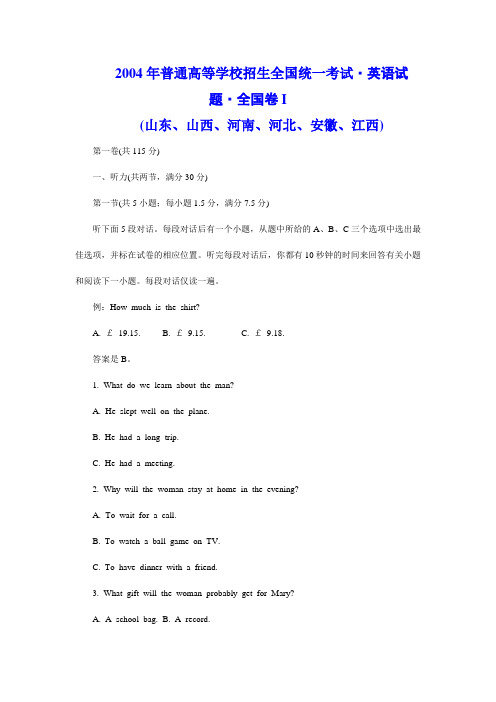
2004年普通高等学校招生全国统一考试·英语试题·全国卷I(山东、山西、河南、河北、安徽、江西) 第一卷(共115分)一、听力(共两节,满分30分)第一节(共5小题;每小题1.5分,满分7.5分)听下面5段对话。
每段对话后有一个小题,从题中所给的A、B、C三个选项中选出最佳选项,并标在试卷的相应位置。
听完每段对话后,你都有10秒钟的时间来回答有关小题和阅读下一小题。
每段对话仅读一遍。
例:How much is the shirt?A. £19.15.B. £9.15.C. £9.18.答案是B。
1. What do we learn about the man?A. He slept well on the plane.B. He had a long trip.C. He had a meeting.2. Why will the woman stay at home in the evening?A. To wait for a call.B. To watch a ball game on TV.C. To have dinner with a friend.3. What gift will the woman probably get for Mary?A. A school bag.B. A record.C. A theatre ticket.4. What does the man mainly do in his spare time?A. Learn a language.B. Do some sports.C. Play the piano.5. What did the woman like doing when she was young?A. Riding a bicycle with friends.B. Travelling the country.C. Reading alone.第二节(共15小题;每小题1.5分,满分22.5分)听下面5段对话或独白。
2004年高考英语试题及答案
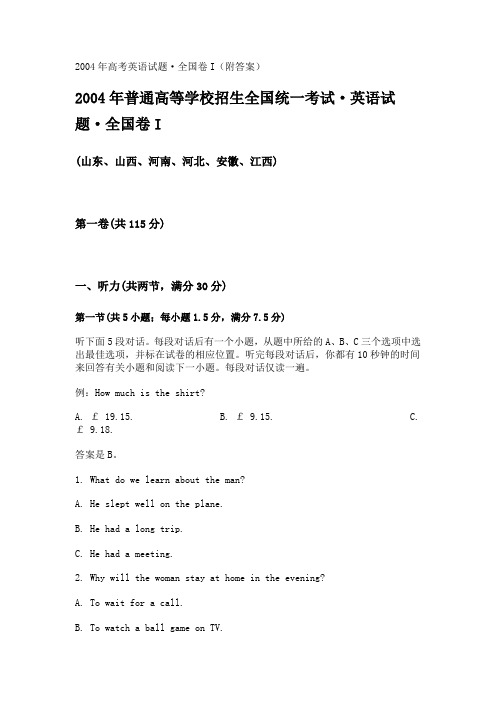
2004年高考英语试题·全国卷I(附答案)2004年普通高等学校招生全国统一考试·英语试题·全国卷I(山东、山西、河南、河北、安徽、江西)第一卷(共115分)一、听力(共两节,满分30分)第一节(共5小题;每小题1.5分,满分7.5分)听下面5段对话。
每段对话后有一个小题,从题中所给的A、B、C三个选项中选出最佳选项,并标在试卷的相应位置。
听完每段对话后,你都有10秒钟的时间来回答有关小题和阅读下一小题。
每段对话仅读一遍。
例:How much is the shirt?A. £ 19.15.B. £ 9.15.C. £ 9.18.答案是B。
1. What do we learn about the man?A. He slept well on the plane.B. He had a long trip.C. He had a meeting.2. Why will the woman stay at home in the evening?A. To wait for a call.B. To watch a ball game on TV.C. To have dinner with a friend.3. What gift will the woman probably get for Mary?A. A school bag.B. A record.C. A theatre ticket.4. What does the man mainly do in his spare time?A. Learn alanguage.B. Do some sports.C. Play the piano.5. What did the woman like doing when she was young?A. Riding a bicycle with friends.B. Travelling the country.C. Reading alone.第二节(共15小题;每小题1.5分,满分22.5分)听下面5段对话或独白。
2011年山东高考专题-2004年英语听力原文(全国卷Ⅰ)
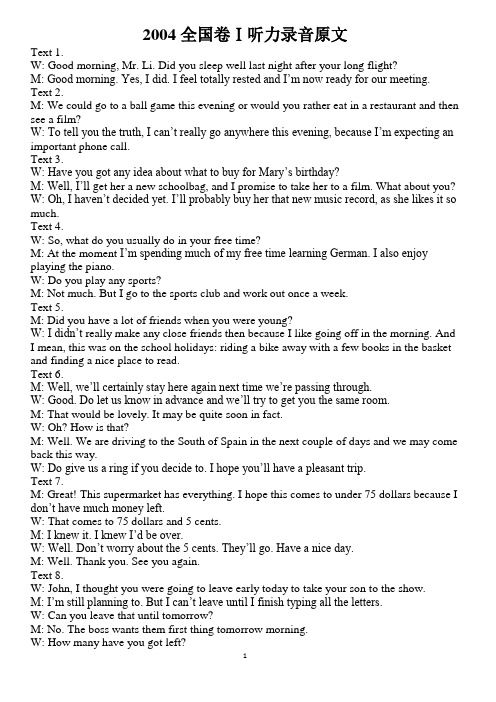
2004全国卷Ⅰ听力录音原文Text 1.W: Good morning, Mr. Li. Did you sleep well last night after your long flight?M: Good morning. Yes, I did. I feel totally rested and I’m now ready for our meeting.Text 2.M: We could go to a ball game this evening or would you rather eat in a restaurant and then see a film?W: To tell you the truth, I can’t really go anywhere this evening, because I’m expecting an important phone call.Text 3.W: Have you got any idea about what to buy for Mary’s birthday?M: Well, I’ll g et her a new schoolbag, and I promise to take her to a film. What about you? W: Oh, I haven’t decided yet. I’ll probably buy her that new music record, as she likes it so much.Text 4.W: So, what do you usually do in your free time?M: At the moment I’m spending much of my free time learning German. I also enjoy playing the piano.W: Do you play any sports?M: Not much. But I go to the sports club and work out once a week.Text 5.M: Did you have a lot of friends when you were young?W: I didn’t really make any close friends then because I like going off in the morning. And I mean, this was on the school holidays: riding a bike away with a few books in the basket and finding a nice place to read.Text 6.M: Well, we’ll certainly stay here again next time we’re passing through.W: Good. Do let us know in advance and we’ll try to get you the same room.M: That would be lovely. It may be quite soon in fact.W: Oh? How is that?M: Well. We are driving to the South of Spain in the next couple of days and we may come back this way.W: Do give us a ring if you decide to. I hope you’ll have a pleasant trip.Text 7.M: Great! This supermarket has everything. I hope this comes to under 75 dollars because I don’t have much money left.W: That comes to 75 dollars and 5 cents.M: I knew it. I knew I’d be over.W: Well. Don’t worry about the 5 cents. They’ll go. Have a nice day.M: Well. Thank you. See you again.Text 8.W: John, I thought you were going to leave early today to take your son to the show.M: I’m still planning to. But I can’t leave until I finish typing all the letters.W: Can you leave that until tomorrow?M: No. The boss wants them first thing tomorrow morning.W: How many have you got left?M: About five.W: Why don’t you just go ahead, John? I’ll do the letters for you.M: Thank you very much, Janet. You’re so kind.Text 9.M: Customer Service. Andney Grant speaking. How may I help you?W: I can’t believe this is happening. I called and ordered a 32-inch bag last Friday. But today I found that you sent a 24-inch one. I was planning to use that bag during our vacation in Mexico, but it doesn’t seem possible any more because we will take off on Saturday. It’s only two days away. What am I supposed to do?M: I’m really sorry, madam. I’ll check right away. Would you please tell me your order number?W: It’s CE2938.M: Just a minute. I do apologize, madam. There did seem to be a mistake. I’ll have the correct size bag sent to you by overnight mail right away. It will arrive in time for your Saturday trip. Again I apologize for any inconvenience caused by our mistake. I promise it won’t happen again.W: Ok. Well. Thank you.M: Thank you, madam, for choosing Linch Mail. I hope you will a wonderful vacation. Text 10.M: Juliet, you chose not to go to college. Why? Was it about money?W: Well. I don’t want to sit here and say I was too poor to go to college. But the fact is that we didn’t have the money, though my mum probably could have made enough somehow. I probably could have worked harder at school and gotten better grades, so, it is really, I didn’t get to go to college. I had a wish to go back to school every other week. It wasn’t just my path.M: At the time did you feel that you were missing something?W: My best friend went off to university and I just remember every time I talk to her. It all sounded so fun and so great. Here I was selling tennis shoes and getting on the bus every day to work in town. We both thought the other’s life was so much more exciting. I was trying hard to make enough to pay for my own flat every month and that seemed so exciting to her. And she would talk about studying for finals, and going to parties, and I thought, God, she is so perfect.。
2011年英语听力(全国卷Ⅰ)听力原文
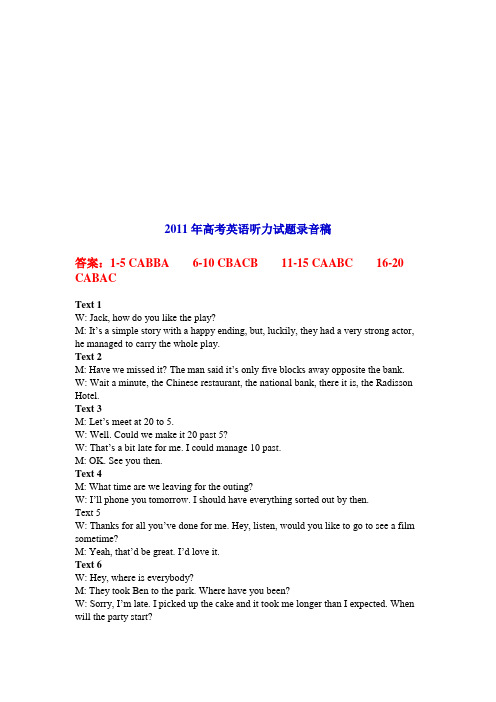
2011年高考英语听力试题录音稿答案:1-5 CABBA 6-10 CBACB 11-15 CAABC 16-20 CABACText 1W: Jack, how do you like the play?M: It’s a simple story with a happy ending, but, luckily, they had a very strong actor, he managed to carry the whole play.Text 2M: Have we missed it? The man said it’s only five blocks away opposite the bank. W: Wait a minute, the Chinese restaurant, the national bank, there it is, the Radisson Hotel.Text 3M: Let’s meet at 20 to 5.W: Well. Could we make it 20 past 5?W: That’s a bit late for me. I could manage 10 past.M: OK. See you then.Text 4M: What time are we leaving for the outing?W: I’ll phone you tomorrow. I should have everything sorted out by then.Text 5W: Thanks for all you’ve done for me. Hey, listen, would you li ke to go to see a film sometime?M: Yeah, that’d be great. I’d love it.Text 6W: Hey, where is everybody?M: They took Ben to the park. Where have you been?W: Sorry, I’m late. I picked up the cake and it took me longer than I expected. When will the party start?M: Ben invited eight children from school. And they’ll arrive at about 2 in the afternoon.W: OK. Then I’ll put the candles on the cake and leave it in the kitchen and then I’ll come and help set the table.Text 7M: So, Macy, how was your holiday?W: Oh, we loved it. Tom liked Germany best, but France was my favorite.M: So did Rachael finally go with you?W: No, she wasn’t able to. She was called away for a business trip to China.M: That’s a pity. So where exactly did you go and visit?W: Well, we traveled all over, Italy, Spain and Holland; we even bathed in a Swiss lakeM: You did, really?Text 8W: Bob, I’m sure you know about second-hand smoke.M: Of course, I do.W: But have you heard about third-hand smoke?M: Third-hand smoke? I’m afraid n ot. What is that then?W: Well, it is here in today’s paper. Parents may think they are protecting children from second-hand smoke when they smoke outside their home or only when the children are not there. But now researchers are warning about what they callthird-hand smoke. When you smoke dangerous matter from cigarettes get into your hair and clothing. As babies are the weakest, when you come to a baby, you pass it to the baby and increase the chances of disease in the baby.M: Is that so? In that case I have to say that I should never get close to a baby.W: That’s right. Actually all smoking parents should do the same or better give it up completely.Text 9M: Hello, welcome to our program “Today City”. I’m Larry. We’re going to Louisville Kentucky where our guest Michelle Ray comes from. She is proud of her middle-sized city with a small town feel and big city dreams. Now, Michelle, tell us about your city.W: Thank you, Larry. Here is my city. Louisville is my city. The first place I take visitors from out of town is to the Highlands for shopping and night life. When I have delicious Asian food I always go to the Zen Garden which provides wonderful all vegetable dishes.M: Wow, that’s interesting. Many people go for healthy food now.W: You can say that again. If I want to go camping and fishing, I go to the Red River area. For complete quiet I can hide away in my house with a good book from one of our public libraries.M: That all sounds very exciting. I’m sure some of our listeners will include Louisville in their travel plan for their next holiday. Thank you, Michelle.Text 10M: We are glad to have Dr. Garfield to talk to us today about dreams. Let me start by asking the first question. Does everyone dream?W: It appears that everyone does. Mostly when people say that they never dream, what they really mean is that they don’t remember their dreams or they don’t think their dreams are important. The reason behind is that they might have been made fun of with a child when they first reported their dreams or it was so frightening that they just turned off dreaming completely. The other day, someone named Davis came to me and said that he used to be a great dreamer, but suddenly he stopped having dreams. I asked him what it happened. It turned out that his brother died by heart attack and he never expected that such a terrible thing would happen to a young person. Generally, when there was some frightening event and dream about it was too terrible. People prefer not to dream about it. Actually the worst thing you can do is stop dreaming. Because it means that the bad experience would be too painful to even appear in dreams. As long as you dream about it and even the dream is frightening, your mind is working on it. My personal opinion about what dreams do is that they help us deal with our problems. We see certain patterns take place in dreams. When a person is hurt deep inside, when a person is seriously ill or when a person has been really sad, if people turn off their dreams totally, it means they don’t lo ve themselves to even think about it.。
2011年高考听力原文、题目及答案(全国卷)
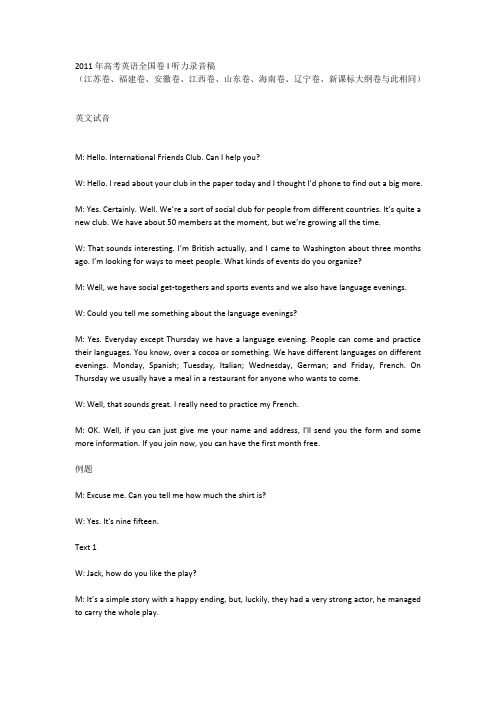
2011年高考英语全国卷I听力录音稿(江苏卷、福建卷、安徽卷、江西卷、山东卷、海南卷、辽宁卷、新课标大纲卷与此相同)英文试音M: Hello. International Friends Club. Can I help you?W: Hello. I read about your club in the paper today and I thought I’d phone to find out a big more. M: Yes. Certainly. Well. We’re a sort of social club for people from different countries. It’s quite a new club. We have about 50 members at the moment, but we’re growing all the time.W: That sounds interesting. I’m British actually, and I came to Washington about three months ago. I’m looking for ways to meet people. What kinds of events do you organize?M: Well, we have social get-togethers and sports events and we also have language evenings. W: Could you tell me something about the language evenings?M: Yes. Everyday except Thursday we have a language evening. People can come and practice their languages. You know, over a cocoa or something. We have different languages on different evenings. Monday, Spanish; Tuesday, Italian; Wednesday, German; and Friday, French. On Thursday we usually have a meal in a restaurant for anyone who wants to come.W: Well, that sounds great. I really need to practice my French.M: OK. Well, if you can just give me your name and address, I'll send you the form and some more information. If you join now, you can have the first month free.例题M: Excuse me. Can you tell me how much the shirt is?W: Yes. It's nine fifteen.Text 1W: Jack, how do you like the play?M: It’s a simple story with a happy ending, but, luckily, they had a very strong actor, he managed to carry the whole play.Text 2M: Have we missed it? The man said it’s only five blocks away opposite the bank.W: Wait a minute, the Chinese restaurant, the national bank, there it is, the Radisson Hotel. Text 3M: Let’s meet at 20 to 5.W: Well. Could we make it 20 past 5?W: That’s a bit late for me. I could manage 10 past.M: OK. See you then.Text 4M: What time are we leaving for the outing?W: I’ll phone you tomorrow. I should have everything sorted out by then.Text 5W: Thanks for all you’ve done for me. Hey, listen, would you like to go to see a film sometime? M: Yeah, that’d be great. I’d love it.Text 6W: Hey, where is everybody?M: They took Ben to the park. Where have you been?W: Sorry, I’m late. I picked up the cake and it took me longer than I expected. When will the party start?M: Ben invited eight children from school. And they’ll arrive at about 2 in the afternoon.W: OK. Then I’ll put the candles on the cake and leave it in the kitchen and then I’ll come andhelp set the table.Text 7M: So, Macy, how was your holiday?W: Oh, we loved it. Tom liked Germany best, but France was my favorite.M: So did Rachael finally go with you?W: No, she wasn’t able to. She was called away for a business trip to China.M: That’s a pity. So where exactly did you go and visit?W: Well, we traveled all over, Italy, Spain and Holland; we even bathed in a Swiss lakeM: You did, really?Text 8W: Bob, I’m sure you know about second-hand smoke.M: Of course, I do.W: But have you heard about third-hand smoke?M: Third-hand smoke? I’m afraid not. What is that then?W: Well, it is here in today’s paper. Parents may think they are protecting children from second-hand smoke when they smoke outside their home or only when the children are not there. But now researchers are warning about what they call third-hand smoke. When you smoke dangerous matter from cigarettes get into your hair and clothing. As babies are the weakest, when you come to a baby, you pass it to the baby and increase the chances of disease in the baby.M: Is that so? In that case I have to say that I should never get close to a baby.W: That’s right. Actually all smoking parents should do the same or better give it up completely. Text 9M: Hello, welcome to our program “Today City”. I’m Larry. We’re going to Louisville Kentucky where our guest Michelle Ray comes from. She is proud of her middle-sized city with a smalltown feel and big city dreams. Now, Michelle, tell us about your city.W: Thank you, Larry. Here is my city. Louisville is my city. The first place I take visitors from out of town is to the Highlands for shopping and night life. When I have delicious Asian food I always go to the Zen Garden which provides wonderful all vegetable dishes.M: Wow, that’s interesting. Many people go for healthy food now.W: You can say that again. If I want to go camping and fishing, I go to the Red River area. For complete quiet I can hide away in my house with a good book from one of our public libraries.M: That all sounds very exciting. I’m sure some of our listeners will include Louisville in their travel plan for their next holiday. Thank you, Michelle.Text 10M: We are glad to have Dr. Garfield to talk to us today about dreams. Let me start by asking the first question. Does everyone dream?W: It appears that everyone does. Mostly when people say that they never dream, what they really mean is that they don’t remember their dreams or they don’t think their dreams are important. The reason behind is that they might have been made fun of with a child when they first reported their dreams or it was so frightening that they just turned off dreaming completely. The other day, someone named Davis came to me and said that he used to be a great dreamer, but suddenly he stopped having dreams. I asked him what it happened. It turned out that his brother died by heart attack and he never expected that such a terrible thing would happen to a young person. Generally, when there was some frightening event and dream about it was too terrible. People prefer not to dream about it. Actually the worst thing you can do is stop dreaming. Because it means that the bad experience would be too painful to even appear in dreams. As long as you dream about it and even the dream is frightening, your mind is working on it. My personal opinion about what dreams do is that they help us deal with our problems. We see certain patterns take place in dreams. When a person is hurt deep inside, when a person is seriously ill or when a person has been really sad, if people turn off their dreams totally, it means they don’t love themselves to even think about it.2011高考听力全国卷第一节(共5小题;每小题1.5分,满分7.5分)1.What does the man like about the play?A.The story.B.The ending.C.The actor.2. Which place are the speakers trying to find?A.hotel.B.bank.C.restaurant.3.At what time will the two speakers meet?A.5:20.B.5:l0.C.4:40.4.what will the man do?A.Change the plan.B.Wait for a phone call.C.Sort things out.5.What does the woman want to do?A.See a film with the man.B.Offer the mall some help.C.Listen to some great music.第二节(共15小题:每小题1.5分,满分22.5分)听下面5段对话。
2004高考英语试题全国卷I及参考答案
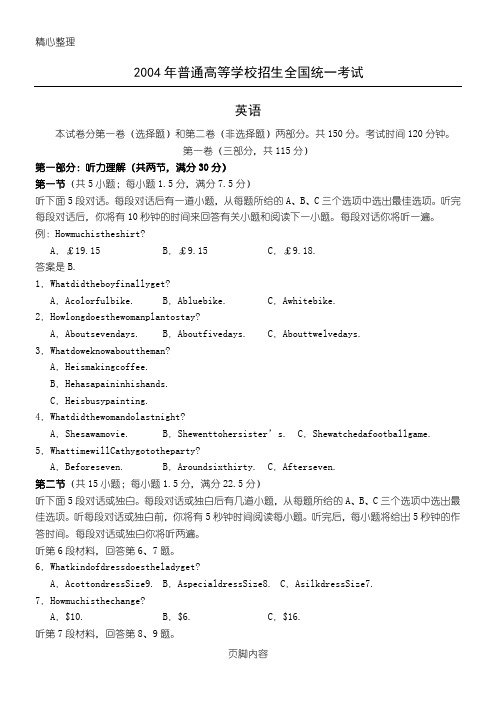
2004年普通高等学校招生全国统一考试英语本试卷分第一卷(选择题)和第二卷(非选择题)两部分。
共150分。
考试时间120分钟。
第一卷(三部分,共115分)第一部分:听力理解(共两节,满分30分)第一节(共5小题;每小题1.5分,满分7.5分)听下面5每段对话后,你将有10例:Howmuchistheshirt?A.£19.15 B.£9.15答案是B.1.Whatdidtheboyfinallyget?A.Acolorfulbike. B.Abluebike.2.Howlongdoesthewomanplantostay?A.Aboutsevendays. B.3.A.B.C.4.A.C.Shewatchedafootballgame.5.A.C.Afterseven.第二节(共听下面5A、B、C三个选项中选出最佳选项。
听每段对话或独白前,你将有5秒钟时间阅读每小题。
听完后,每小题将给出5秒钟的作答时间。
每段对话或独白你将听两遍。
听第6段材料,回答第6、7题。
6.Whatkindofdressdoestheladyget?A.AcottondressSize9. B.AspecialdressSize8. C.AsilkdressSize7. 7.Howmuchisthechange?A.$10. B.$6. C.$16.听第7段材料,回答第8、9题。
8.Whatdidthemandoduringtheseweeks?A.Herodetothecountryseveraltimes.B.Hespenthisholidaysawayfromthecity.C.Hemanagedtovisitthetower.9.Howdoesthemanfeelaboutwhathe’sdone?A.Hefeelsregretful. B.Hefeelscontent. C.Hefeelsdisappointed.听第8段材料,回答第10至12题。
2011年全国统一高考英语试卷听力+原文+答案(新课标)
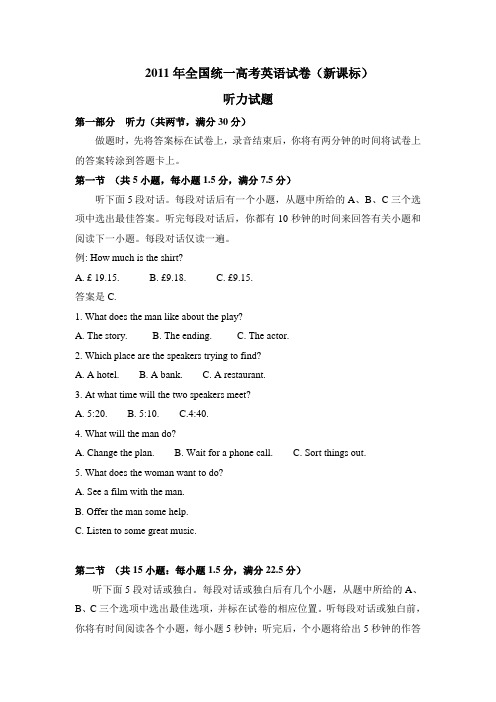
2011年全国统一高考英语试卷(新课标)听力试题第一部分听力(共两节,满分30分)做题时,先将答案标在试卷上,录音结束后,你将有两分钟的时间将试卷上的答案转涂到答题卡上。
第一节(共5小题,每小题1.5分,满分7.5分)听下面5段对话。
每段对话后有一个小题,从题中所给的A、B、C三个选项中选出最佳答案。
听完每段对话后,你都有10秒钟的时间来回答有关小题和阅读下一小题。
每段对话仅读一遍。
例: How much is the shirt?A. £ 19.15.B. £9.18.C. £9.15.答案是C.1. What does the man like about the play?A. The story.B. The ending.C. The actor.2. Which place are the speakers trying to find?A. A hotel.B. A bank.C. A restaurant.3. At what time will the two speakers meet?A. 5:20.B. 5:10.C.4:40.4. What will the man do?A. Change the plan.B. Wait for a phone call.C. Sort things out.5. What does the woman want to do?A. See a film with the man.B. Offer the man some help.C. Listen to some great music.第二节(共15小题:每小题1.5分,满分22.5分)听下面5段对话或独白。
每段对话或独白后有几个小题,从题中所给的A、B、C三个选项中选出最佳选项,并标在试卷的相应位置。
听每段对话或独白前,你将有时间阅读各个小题,每小题5秒钟;听完后,个小题将给出5秒钟的作答时间。
(完整word)2011年全国高考英语听力试题暨听力原文

2011年全国高考英语听力试题暨听力原文第一部分听力(共两节,满分30分)第一节(共5小题;每小题1.5分,满分7.5分)听下面5段对话。
每段对话后有一个小题,从题中所给的A、B、C三个选项中选出最佳选项,并标在试卷的相应位置。
听完每段对话后,你都有10秒钟的时间来回答有关小题和阅读下一小题。
每段对话仅读一遍。
1. What does the man like about the play?A. The story.B. The ending.C. The actor.2. Which place are the speakers trying to find?A. A hotel.B. A bank.C. A restaurant.3. At what time will the two speakers meet?A. 5:20.B. 5:10.C. 4:40.4. What will the man do?A. Change the plan.B. Wait for a phone call.C. Sort things out.5. What does the woman want to do?A. See a film with the man.B. Offer the man some help.C. Listen to some great music.第二节(共15小题:每小题1.5分,满分22.5分)请听下面5段对话。
每段对话后有几个小题,从题中所给出的A、B、C三个选项种选出最佳选项,并标在试卷的相应位置。
听每段对话前,你将有时间阅读各个小题。
,每小题5秒钟;听完后,各小题给出5秒钟的作答时间。
每段对话读两遍。
听第6段材料,回答6、7题。
6. Where is Ben?A. In the kitchen.B. At school.C. In the park.7. What will the children do in the afternoon?A. Help set the table.B. Have a party.C. Do their homework.听第7段材料,回答第8、9题8. What are the two speakers talking about?A. A Family holiday.B. A business trip.C. A travel plan.9. Where did Rachel go?A. Spain.B. Italy.C. China.听第8段材料,回答第10至12题。
2004年普通高等学校招生全国统一考试全国卷Ⅰ(英语)听力文本

2004年普通高等学校招生全国统一考试全国卷Ⅰ(英语)听力文本一、听力第一节(共两节,满分30分)听下面5段对话。
每段对话后有一个小题,从题中所给的A、B、C三个选项中选出最佳选项,并标在试卷的相应位置。
听完每段对话后,你都有10秒钟的时间来回答有关小题和阅读下一小题。
每段对话仅读一遍。
例:How much is the shirt? A. 19.15. B. 9.15. C. 9.18. 答案是B。
1、What do we learn about the man.A. He slept well on the plane.B. He had a long trip.C. He had a meeting.2、Why will the woman stay home in the evening?A. To wait for a call.B. To watch a ball game on TV.C. To have dinner with a friend.3、What gift will the woman probably get for Mary?A. A school bag.B. A record.C. A theatre ticket.4、What does the man mainly do in his spare time?A. Learn a language.B. Do some sports.C. Play the piano.5、What did the woman like doing when she was young?A. Riding a bicycle with friends.B. Travelling the country.C. Reading alone.二、听力第二节(共15小题,每小题1.5分,满分22.5分)听下面5段对话或独白。
每段对话或独白后有几个小题,从题中所给的A、B、C三个选项中选出最佳选项,并标在试卷的相应位置。
2011高考英语听力全国卷试题原文答案
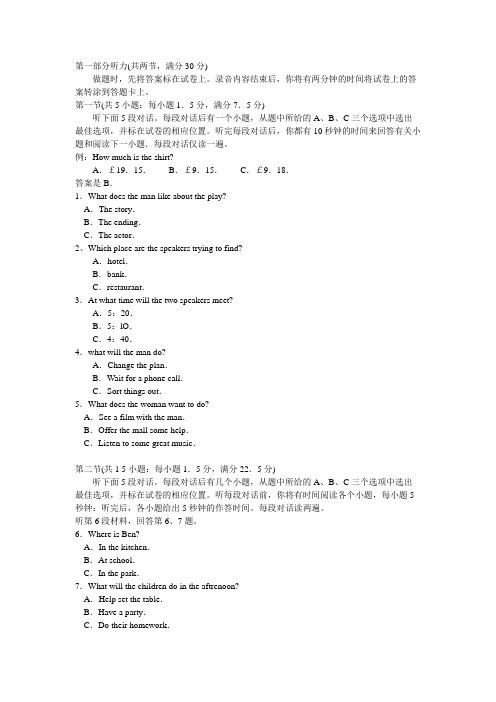
第一部分听力(共两节,满分30分)做题时,先将答案标在试卷上。
录音内容结束后,你将有两分钟的时间将试卷上的答案转涂到答题卡上。
第一节(共5小题;每小题1.5分,满分7.5分)听下面5段对话。
每段对话后有一个小题,从题中所给的A、B、C三个选项中选出最佳选项,并标在试卷的相应位置。
听完每段对话后,你都有10秒钟的时间来回答有关小题和阅读下一小题.每段对话仅读一遍。
例:How much is the shirt?A.£19.15.B.£9.15.C.£9.18.答案是B.1.What does the man like about the play?A.The story.B.The ending.C.The actor.2、Which place are the speakers trying to find?A.hotel.B.bank.C.restaurant.3.At what time will the two speakers meet?A.5:20.B.5:lO.C.4:40.4.what will the man do?A.Change the plan.B.Wait for a phone call.C.Sort things out.5.What does the woman want to do?A.See a film with the man.B.Offer the mall some help.C.Listen to some great music.第二节(共1 5小题:每小题1.5分,满分22.5分)听下面5段对话。
每段对话后有几个小题,从题中所给的A、B、C三个选项中选出最佳选项,并标在试卷的相应位置。
听每段对话前,你将有时间阅读各个小题,每小题5 秒钟:听完后,各小题给出5秒钟的作答时间。
每段对话读两遍。
听第6段材料,回答第6、7题。
6.Where is Ben?A.In the kitchen.B.At school.C.In the park.7.What will the children do in the aftrenoon?A.Help set the table.B.Have a party.C.Do their homework.听第7段材料,回答第8、9题。
2011年高考全国卷英语听力试题(含试题、听力音频、听力原文和答案)
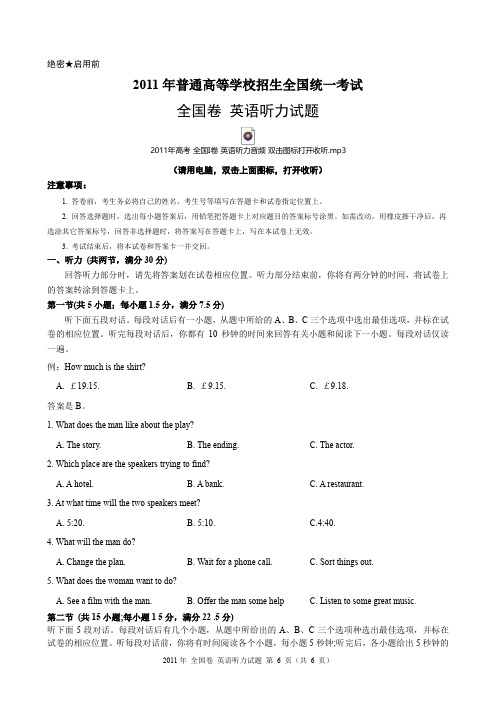
绝密★启用前2011年普通高等学校招生全国统一考试全国卷英语听力试题2011年高考 全国I卷 英语听力音频 双击图标打开收听.mp3(请用电脑,双击上面图标,打开收听)注意事项:1. 答卷前,考生务必将自己的姓名、考生号等填写在答题卡和试卷指定位置上。
2. 回答选择题时,选出每小题答案后,用铅笔把答题卡上对应题目的答案标号涂黑。
如需改动,用橡皮擦干净后,再选涂其它答案标号,回答非选择题时,将答案写在答题卡上,写在本试卷上无效。
3. 考试结束后,将本试卷和答案卡一并交回。
一、听力(共两节,满分30分)回答听力部分时,请先将答案划在试卷相应位置。
听力部分结束前,你将有两分钟的时间,将试卷上的答案转涂到答题卡上。
第一节(共5小题;每小题1.5分,满分7.5分)听下面五段对话。
每段对话后有一小题,从题中所给的A、B、C三个选项中选出最佳选项,并标在试卷的相应位置。
听完每段对话后,你都有10秒钟的时间来回答有关小题和阅读下一小题。
每段对话仅读一遍。
例:How much is the shirt?A. £19.15.B. £9.15.C. £9.18.答案是B。
1. What does the man like about the play?A. The story.B. The ending.C. The actor.2. Which place are the speakers trying to find?A. A hotel.B. A bank.C. A restaurant.3. At what time will the two speakers meet?A. 5:20.B. 5:10.C.4:40.4. What will the man do?A. Change the plan.B. Wait for a phone call.C. Sort things out.5. What does the woman want to do?A. See a film with the man.B. Offer the man some helpC. Listen to some great music.第二节(共15小题;每小题1 5分,满分22 .5分)听下面5段对话。
2004年英语听力(全国卷Ⅰ)听力真题+答案
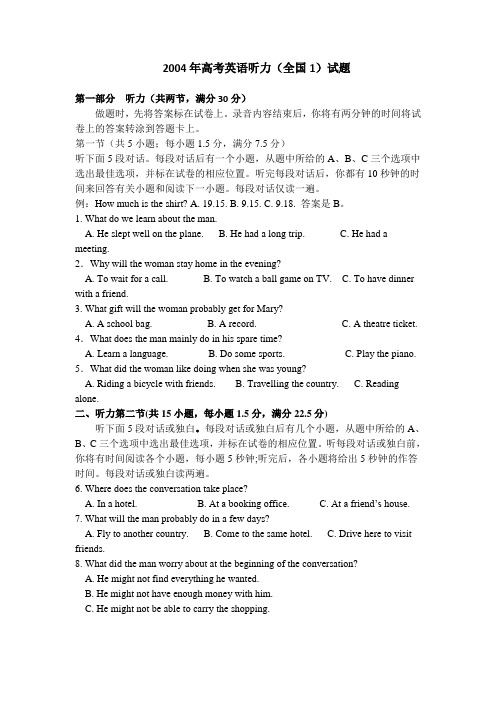
2004年高考英语听力(全国1)试题第一部分听力(共两节,满分30分)做题时,先将答案标在试卷上。
录音内容结束后,你将有两分钟的时间将试卷上的答案转涂到答题卡上。
第一节(共5小题;每小题1.5分,满分7.5分)听下面5段对话。
每段对话后有一个小题,从题中所给的A、B、C三个选项中选出最佳选项,并标在试卷的相应位置。
听完每段对话后,你都有10秒钟的时间来回答有关小题和阅读下一小题。
每段对话仅读一遍。
例:How much is the shirt? A. 19.15. B. 9.15. C. 9.18. 答案是B。
1. What do we learn about the man.A. He slept well on the plane.B. He had a long trip.C. He had a meeting.2.Why will the woman stay home in the evening?A. To wait for a call.B. To watch a ball game on TV.C. To have dinner with a friend.3. What gift will the woman probably get for Mary?A. A school bag.B. A record.C. A theatre ticket. 4.What does the man mainly do in his spare time?A. Learn a language.B. Do some sports.C. Play the piano. 5.What did the woman like doing when she was young?A. Riding a bicycle with friends.B. Travelling the country.C. Reading alone.二、听力第二节(共15小题,每小题1.5分,满分22.5分)听下面5段对话或独白。
2011年高考英语试卷听力+原文+答案(新课标)
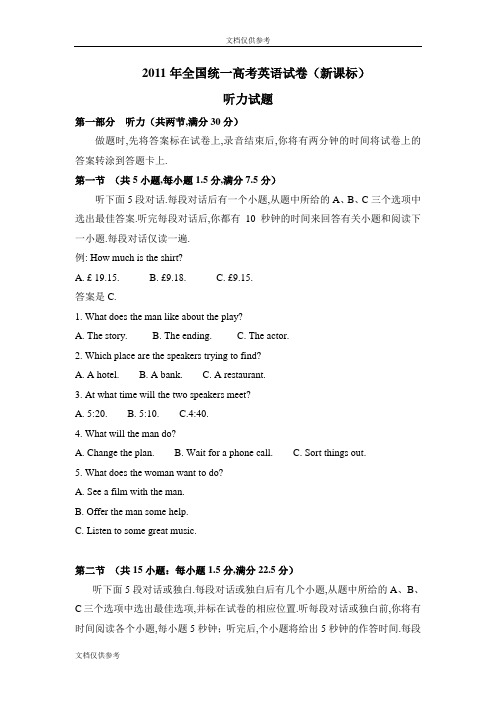
2011年全国统一高考英语试卷(新课标)听力试题第一部分听力(共两节,满分30分)做题时,先将答案标在试卷上,录音结束后,你将有两分钟的时间将试卷上的答案转涂到答题卡上.第一节(共5小题,每小题1.5分,满分7.5分)听下面5段对话.每段对话后有一个小题,从题中所给的A、B、C三个选项中选出最佳答案.听完每段对话后,你都有10秒钟的时间来回答有关小题和阅读下一小题.每段对话仅读一遍.例: How much is the shirt?A. £ 19.15.B. £9.18.C. £9.15.答案是C.1. What does the man like about the play?A. The story.B. The ending.C. The actor.2. Which place are the speakers trying to find?A. A hotel.B. A bank.C. A restaurant.3. At what time will the two speakers meet?A. 5:20.B. 5:10.C.4:40.4. What will the man do?A. Change the plan.B. Wait for a phone call.C. Sort things out.5. What does the woman want to do?A. See a film with the man.B. Offer the man some help.C. Listen to some great music.第二节(共15小题:每小题1.5分,满分22.5分)听下面5段对话或独白.每段对话或独白后有几个小题,从题中所给的A、B、C三个选项中选出最佳选项,并标在试卷的相应位置.听每段对话或独白前,你将有时间阅读各个小题,每小题5秒钟;听完后,个小题将给出5秒钟的作答时间.每段对话或独白读两遍.听第6段材料,回答6、7题.6. Where is Ben?A. In the kitchen.B. At school.C. In the park.7. What will the children in the afternoon?A. Help set the table.B. Have a party.C. Do their homework.听第7段材料,回答第8、9题.8. What are the two speakers talking about?A. A Family holiday.B. A business trip.C. A travel plan.9. Where did Rachel go?A. Spain.B. Italy.C. China.听第8段材料,回答第10至12题.10. How did the woman get to know about third-hand smoke?A. From young smokers.B. From a newspaper article.C. From some smoking parents.11. Why does the man say that he should keep away from babies?A. He has just become a father.B. He wears dirty clothes.C. He is a smoker.12. What does the woman suggest smoking parents should do ?A. Stop smoking altogether.B. Smoke only outside their houses.C. Reduce dangerous matter in cigarettes.听第9段材料,回答第13至16题.13. Where does Michelle Ray come from?A. A middle-sized city.B. A small town.C. A big city.14. Which place would Michelle Ray take her visitors to for shopping?A. The Zen GardenB. The Highlands.C. The Red River area.15. What does Michelle Ray do for complete quiet?A. Go camping.B. Study in a library.C. Read at home.16. What are the speakers talking about in general?A. Late-night shopping.B. Asian food.C. Louisville.听第10段材料,回答第17至20题.17. Why do some people say they never have dreams according to Dr Garfield?A. They forget about their dreams.B. They don’t want to tell the truth.C. They have no bad experiences.18. Why did Davis stop having dreams?A. He got a serious heart attack.B. He was too sad about his brother's deathC. He was frightened by a terrible dream.19. What is Dr Garfield s opinion about dreaming?A. It is very useful.B. It makes things worse.C. It prevents the mind from working.20. Why do some people turn off their dreams completely?A. To sleep better.B. To recover from illnesses.C. To stay away from their problems.2011年全国统一高考英语试卷(新课标)听力试题答案及原文【参考答案】1-5 CABBA 6-10 CBACB 11-15 CAABC 16-20 CABAC听力原文:第一节(共5小题,每小题1.5分,满分7.5分)听下面5段对话.每段对话后有一个小题,从题中所给的A、B、C三个选项中选出最佳答案.听完每段对话后,你都有10秒钟的时间来回答有关小题和阅读下一小题.每段对话仅读一遍.Text 1W: Jack, how do you like the play?M: It’s a simple story with a happy ending, but, luckily, they had a very strong actor, he managed to carry the whole play.Text 2M: Have w e missed it? The man said it’s only five blocks away opposite the bank. W: Wait a minute, the Chinese restaurant, the national bank, there it is, the Radisson Hotel.Text 3M: Let’s meet at 20 to 5.W: Well. Could we make it 20 past 5?W: That’s a bit lat e for me. I could manage 10 past.M: OK. See you then.Text 4M: What time are we leaving for the outing?W: I’ll phone you tomorrow. I should have everything sorted out by then.Text 5W: Thanks for all you’ve done for me. Hey, listen, would you like to go to see a film sometime?M: Yeah, that’d be great. I’d love it.第二节(共15小题:每小题1.5分,满分22.5分)听下面5段对话或独白.每段对话或独白后有几个小题,从题中所给的A、B、C三个选项中选出最佳选项,并标在试卷的相应位置.听每段对话或独白前,你将有时间阅读各个小题,每小题5秒钟;听完后,个小题将给出5秒钟的作答时间.每段对话或独白读两遍.Text 6W: Hey, where is everybody?M: They took Ben to the park. Where have you been?W: Sorry, I’m late. I picked up the cake and it took me longer than I expected. When will the party start?M: Ben invited eight children from school. And they’ll arrive at about 2 in the afternoon.W: OK. Then I’ll put the candles on the cake and leave it in the kitchen and then I’ll come and help set the table.Text 7M: So, Macy, how was your holiday?W: Oh, we loved it. Tom liked Germany best, but France was my favorite.M: So did Rachael finally go with you?W: No, she wasn’t able to. She was called away for a business trip to China.M: That’s a pity. So where exactly did you go and visit?W: Well, we traveled all over, Italy, Spain and Holland; we even bathed in a Swiss lake.M: You did, really?Text 8W: B ob, I’m sure you know about second-hand smoke.M: Of course, I do.W: But have you heard about third-hand smoke?M: Third-hand smoke? I’m afraid not. What is that then?W: Well, it is here in today’s paper. Parents may think they are protecting children from second-hand smoke when they smoke outside their home or only when the children are not there. But now researchers are warning about what they callthird-hand smoke. When you smoke dangerous matter from cigarettes get into your hair and clothing. As babies are the weakest, when you come to a baby, you pass it to the baby and increase the chances of disease in the baby.M: Is that so? In that case I have to say that I should never get close to a baby.W: That’s right. Actually all smoking parents should do the same or better give it up completely.Text 9M: Hello, welcome to our program “Today City”. I’m Larry. We’re going to Louisville Kentucky where our guest Michelle Ray comes from. She is proud of her middle-sized city with a small town feel and big city dreams. Now, Michelle, tell us about your city.W: Thank you, Larry. Here is my city. Louisville is my city. The first place I take visitors from out of town is to the Highlands for shopping and night life. When I have delicious Asian food I always go to the Zen Garden which provides wonderful all vegetable dishes.M: Wow, that’s interesting. Many people go for healthy food now.W: You can say that again. If I want to go camping and fishing, I go to the Red River area. For complete quiet I can hide away in my house with a good book from one of our public libraries.M: That all sounds very exciting. I’m sure some of our listeners will include Louisville in their travel plan for their next holiday. Thank you, Michelle.Text 10M: We are glad to have Dr. Garfield to talk to us today about dreams. Let me start by asking the first question. Does everyone dream?W: It appears that everyone does. Mostly when people say that they never dream, what they really mean is that they don’t remember their dreams or they don’t think their dreams are important. The reason behind is that they might have been made fun of with a child when they first reported their dreams or it was so frightening that they just turned off dreaming completely. The other day, someone named Davis came to me and said that he used to be a great dreamer, but suddenly he stopped having dreams. I asked him what it happened. It turned out that his brother died by heart attack and he never expected that such a terrible thing would happen to a young person. Generally, when there was some frightening event and dream about it was too terrible. People prefer not to dream about it. Actually the worst thing you can do is stop dreaming. Because it means that the bad experience would be too painful to even appear in dreams. As long as you dream about it and even the dream is frightening, your mind is working on it. My personal opinion about what dreams do is that they help us deal with our problems. We see certain patterns take place in dreams. When a person is hurt deep inside, when a person is seriously ill or when a person has been really sad, if people turn off their dreams totally, it means they don’t love themselves to even think about it.2019高中教师读书心得体会作为教师,在教授知识的提示,也应该利用空暇时刻渐渐品读一些好书,吸收书中的精华。
2011年全国高考听力及原文(全国卷1卷)
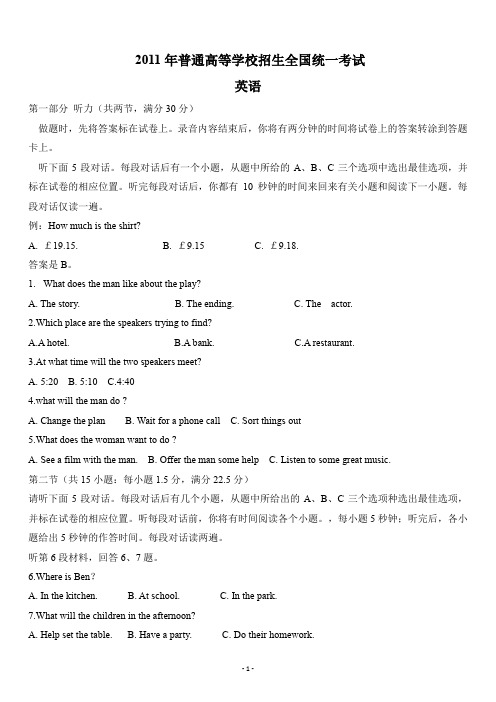
2011年普通高等学校招生全国统一考试英语第一部分听力(共两节,满分30分)做题时,先将答案标在试卷上。
录音内容结束后,你将有两分钟的时间将试卷上的答案转涂到答题卡上。
听下面5段对话。
每段对话后有一个小题,从题中所给的A、B、C三个选项中选出最佳选项,并标在试卷的相应位置。
听完每段对话后,你都有10秒钟的时间来回来有关小题和阅读下一小题。
每段对话仅读一遍。
例:How much is the shirt?A. £19.15.B. £9.15C. £9.18.答案是B。
1.What does the man like about the play?A. The story.B. The ending.C. The actor.2.Which place are the speakers trying to find?A.A hotel.B.A bank.C.A restaurant.3.At what time will the two speakers meet?A. 5:20B. 5:10C.4:404.what will the man do ?A. Change the planB. Wait for a phone callC. Sort things out5.What does the woman want to do ?A. See a film with the man.B. Offer the man some helpC. Listen to some great music.第二节(共15小题:每小题1.5分,满分22.5分)请听下面5段对话。
每段对话后有几个小题,从题中所给出的A、B、C三个选项种选出最佳选项,并标在试卷的相应位置。
听每段对话前,你将有时间阅读各个小题。
,每小题5秒钟;听完后,各小题给出5秒钟的作答时间。
每段对话读两遍。
听第6段材料,回答6、7题。
6.Where is Ben?A. In the kitchen.B. At school.C. In the park.7.What will the children in the afternoon?A. Help set the table.B. Have a party.C. Do their homework.听第7段材料,回答第8、9题8. What are the two speakers talking about?A. A Family holiday.B. A business trip.C. A travel plan.9. Where did Rachel go?A. Spain.B. Italy.C. China.听第8段材料,回答第10至12题。
- 1、下载文档前请自行甄别文档内容的完整性,平台不提供额外的编辑、内容补充、找答案等附加服务。
- 2、"仅部分预览"的文档,不可在线预览部分如存在完整性等问题,可反馈申请退款(可完整预览的文档不适用该条件!)。
- 3、如文档侵犯您的权益,请联系客服反馈,我们会尽快为您处理(人工客服工作时间:9:00-18:30)。
学英语简单吗?肯定会有许多学生说:“难死了”。
为什么有好多学生对英语的学习都感到头疼呢?答案只有一个:“不得法。
” 英语与汉语一样都是一种语言,为什么你说汉语会如此流利?那是因为你置身于一个汉语环境中,如果你在伦敦呆上半年,保准说起英语来会非常流利。
但很多中学生没有很好的英语环境,那么你可以自己设置一个英语环境,坚持“多说”、“多听”、“多读”、“多写”,那么你的英语成绩肯定会很出色。
一、多“说”。
自己多创造机会与英语教师多讲英语,见了同学,尤其是和好朋友在一起时尽量用英语去问候,谈心情……这时候你需随身携带一个英汉互译小词典,遇到生词时查一下这些生词,也不用刻意去记,用的多了,这个单词自然而然就会记住。
千万别把学英语当成负担,始终把它当成一件有趣的事情去做。
或许你有机会碰上外国人,你应大胆地上去跟他打招呼,和他谈天气、谈风景、谈学校……只是别问及他的年纪,婚史等私人问题。
尽量用一些你学过的词汇,句子去和他谈天说地。
不久你会发现与老外聊天要比你与中国人谈英语容易的多。
因为他和你交谈时会用许多简单词汇,而且不太看重说法,你只要发音准确,准能顺利地交流下去。
只是你必须要有信心,敢于表达自己的思想。
如果没有合适的伙伴也没关系,你可以拿过一本书或其它什么东西做假想对象,对它谈你一天的所见所闻,谈你的快乐,你的悲伤等等,长此坚持下去你的口语肯定会有较大的提高。
二、多“听”寻找一切可以听英语的机会。
别人用英语交谈时,你应该大胆地去参与,多听听各种各样人的发音,男女老少,节奏快的慢的你都应该接触到,如果这样的机会少的话,你可以选择你不知内容的文章去听,这将会对你帮助很大,而你去听学过的课文的磁带,那将会对你的语言语调的学习有很大的帮助。
三、多“读”。
“读”可以分为两种。
一种是“默读”。
每天给予一定时间的练习将会对你提高阅读速度有很大的好处,读的内容可以是你的课本,但最好是一些有趣的小读物,因为现在的英语高考越来越重视阅读量和阅读速度。
每道题的得分都与你的理解程度有很大关系,所以经过高中三年阅读的训练后,你必定会在高考中胜券在握。
另一种是“朗读”这是学语言必不可少的一种学习途径。
四、多“写”有的同学总是抱怨时间紧,根本没时间写作文。
其实“写”的形式很多,不一定就写作文才提高写作能力。
比如写下你一天中发生的一些重要的事情,或当天学了某一个词组,你可以创设一个语境恰如其份地用上这个词。
这样即可帮你记住这个词的用法,又可以锻炼你的写作能力,比如学“wish”一词时,可写一小段如下:The teacher often asks us what we want to be in the future.My good friend Tom wishes to be a soldier.However,I'm different .I wish I were a teacher in the future.But my mother wishes me to be a doctor.只几句话:但wish的几种用法已跃然纸上,这样写下来印象会深刻得多,这样比死记硬背wish 的用法也有趣轻松的多。
学习英语不用花大块的时间,10分钟的散步可以练"说",吃完饭后可以读一会儿英语小说,睡前听几分钟英语,可以使你得到更好地休息……只要你每天抽出一些时间来练英语,你的英语成绩肯定会很快提高的。
背英语单词技巧1、循环记忆法艾宾浩斯遗忘曲线人的大脑是一个记忆的宝库,人脑经历过的事物,思考过的问题,体验过的情感和情绪,练习过的动作,都可以成为人们记忆的内容。
例如英文的学习中单词、短语和句子,甚至文章的内容都是通过记忆完成的。
从"记"到"忆"是有个过程的,这其中包括了识记、保持、再认和回忆。
有很多人在学习英语的过程中,只注重了学习当时的记忆效果,孰不知,要想做好学习的记忆工作,是要下一番工夫的,单纯的注重当时的记忆效果,而忽视了后期的保持和再认同样是达不到良好的效果的。
在信息的处理上,记忆是对输入信息的编码、贮存和提取的过程,从信息处理的角度上,英文的第一次学习和背诵只是一个输入编码的过程。
人的记忆的能力从生理上讲是十分惊人的,它可以存贮1015比特(byte,字节)的信息,可是每个人的记忆宝库被挖掘的只占10%,还有更多的记忆发挥空间。
这是因为,有些人只关注了记忆的当时效果,却忽视了记忆中的更大的问题--即记忆的牢固度问题,那就牵涉到心理学中常说的关于记忆遗忘的规律。
一、艾宾浩斯记忆规律曲线解释德国有一位著名的心理学家名叫艾宾浩斯(Hermann Ebbinghaus,1850-1909),他在1885年发表了他的实验报告后,记忆研究就成了心理学中被研究最多的领域之一,而艾宾浩斯正是发现记忆遗忘规律的第一人。
根据我们所知道的,记忆的保持在时间上是不同的,有短时的记忆和长时的记忆两种。
而我们平时的记忆的过程是这样的:输入的信息在经过人的注意过程的学习后,便成为了人的短时的记忆,但是如果不经过及时的复习,这些记住过的东西就会遗忘,而经过了及时的复习,这些短时的记忆就会成为了人的一种长时的记忆,从而在大脑中保持着很长的时间。
那么,对于我们来讲,怎样才叫做遗忘呢,所谓遗忘就是我们对于曾经记忆过的东西不能再认起来,也不能回忆起来,或者是错误的再认和错误的回忆,这些都是遗忘。
艾宾浩斯在做这个实验的时候是拿自己作为测试对象的,他得出了一些关于记忆的结论。
他选用了一些根本没有意义的音节,也就是那些不能拼出单词来的众多字母的组合,比如asww,cfhhj,ijikmb,rfyjbc等等。
他经过对自己的测试,得到了一些数据。
然后,艾宾浩斯又根据了这些点描绘出了一条曲线,这就是非常有名的揭示遗忘规律的曲线:艾宾浩斯遗忘曲线,图中竖轴表示学习中记住的知识数量,横轴表示时间(天数),曲线表示记忆量变化的规律。
这条曲线告诉人们在学习中的遗忘是有规律的,遗忘的进程不是均衡的,不是固定的一天丢掉几个,转天又丢几个的,而是在记忆的最初阶段遗忘的速度很快,后来就逐渐减慢了,到了相当长的时候后,几乎就不再遗忘了,这就是遗忘的发展规律,即"先快后慢"的原则。
观察这条遗忘曲线,你会发现,学得的知识在一天后,如不抓紧复习,就只剩下原来的25%)。
随着时间的推移,遗忘的速度减慢,遗忘的数量也就减少。
有人做过一个实验,两组学生学习一段课文,甲组在学习后不久进行一次复习,乙组不予复习,一天后甲组保持98%,乙组保持56%;一周后甲组保持83%,乙组保持33%。
乙组的遗忘平均值比甲组高。
二、不同性质材料有不同的遗忘曲线而且,艾宾浩斯还在关于记忆的实验中发现,记住12个无意义音节,平均需要重复16.5次;为了记住36个无意义章节,需重复54次;而记忆六首诗中的480个音节,平均只需要重复8次!这个实验告诉我们,凡是理解了的知识,就能记得迅速、全面而牢固。
不然,愣是死记硬背,那也是费力不讨好的。
因此,比较容易记忆的是那些有意义的材料,而那些无意义的材料在记忆的时候比较费力气,在以后回忆起来的时候也很不轻松。
因此,艾宾浩斯遗忘曲线是关于遗忘的一种曲线,而且是对无意义的音节而言,对于与其他材料的对比,艾宾浩斯又得出了不同性质材料的不同遗忘曲线,不过他们大体上都是一致的。
因此,艾宾浩斯的实验向我们充分证实了一个道理,学习要勤于复习,而且记忆的理解效果越好,遗忘的也越慢。
三、不同的人有不同的艾宾浩斯记忆曲线--个性化的艾宾浩斯上述的艾宾浩斯记忆曲线是艾宾浩斯在实验室中经过了大量测试后,产生了不同的记忆数据,从而生成的一种曲线,是一个具有共性的群体规律。
此记忆曲线并不考虑接受试验个人的个性特点,而是寻求一种处于平衡点的记忆规律。
但是记忆规律可以具体到我们每个人,因为我们的生理特点、生活经历不同,可能导致我们有不同的记忆习惯、记忆方式、记忆特点。
规律对于自然人改造世界的行为,只能起一个催化的作用,如果与每个人的记忆特点相吻合,那么就如顺水扬帆,一日千里;如果与个人记忆特点相悖,记忆效果则会大打折扣。
因此,我们要根据每个人的不同特点,寻找到属于自己的艾宾浩斯记忆曲线2》如何学英语下定决心,坚持不懈英语学习作为一门语言技能,通过大量的训练和练习任何人是可以掌握的。
一般地说,英语学习的原则是听、说领先,读、写跟上。
李扬的疯狂英语提倡,首先建立起我能学好英语的信心,然后以句子为单位,大量地模仿,疯狂地操练,大声地朗读,最后达到自如地说英语,他的方法对提高说英语的能力很奏效。
钟道隆教授45岁开始学英语,一年后,学成出国当口语翻译,并创造了逆苦恼、逆急于求成、逆速成的逆向学习英语的方法。
他还提出学习英语要遵循听、写、说、背、想的方法,他的方法强调以听为主,并且把所听到的内容全部写下来。
尤其是他的学习精神最可佳,他学习英语用坏了十几台录音机,你可想象他听了多少英语;用完的圆珠笔芯几乎装满了一个一拉罐,你可想象他写了多少,在一年半内,累计业余学习英语时间大约三千小时,也就说每天抽出几个小时来学英语。
如果我们做到他那样,一定也能学好英语。
最重要的是坚持,只要能下定决心,坚持每天至少一个小时的学习英语,战胜自我最后肯定会有收获的。
注意方法,循序渐进决心下定,还注意学习方法,有时根据自己的情况和不同的学习目的,选择不同的学习方法,但是学习英语一定要踏踏实实地、一步一个脚印地走。
要把基础知识掌握好,也就是说,发音要正确、基本词汇要掌握牢、基本句式要熟练、基本语法要会用。
(1)要过好语音关。
把每一个音标发正确,注意改正有问题的音素,特别是那些容易混淆的音素,尽早地掌握国际音标,并尽量的掌握一些读音规则,尽快地能利用读音规则来拼单词,掌握读音规则对单词的记忆和拼写非常有用。
(2)掌握一定数量的英语单词。
对于学习者来说掌握英语词汇是一难关,学习单词要从单词的形、音、义这三方面去掌握,要注意单词的一词多义,一词多类的用法,要学会一些构词法的知识,来扩展词汇量。
学习单词要在语言材料中去学,要结合词组,通过句子,阅读文章来活记单词,死记的单词是记不牢的。
坚持在读、说前,先反复听,听的时候反应单词、句子的意思和节奏,想一下单词的拼法、句子结构。
并要同学习语法规则有机结合起来进行。
(3)掌握好基本语法。
语法在学习英语中也很重要,它能帮助我们把握住英语的基本规律,通过例句或语言现象把死的语法规则要记住,活的规则要通过做大量的练习掌握。
总之学习英语要通过听、说、读、写、译来进行操练,不但要注意数量,更重要的是要注意质量,尤其是基本知识要掌握的准确,熟练。
只有经过大量的实践,才能做到熟能生巧,运用自如。
提前预习,有的放矢作为学生,在每次上课前,都要对要学的课文提前预习。
